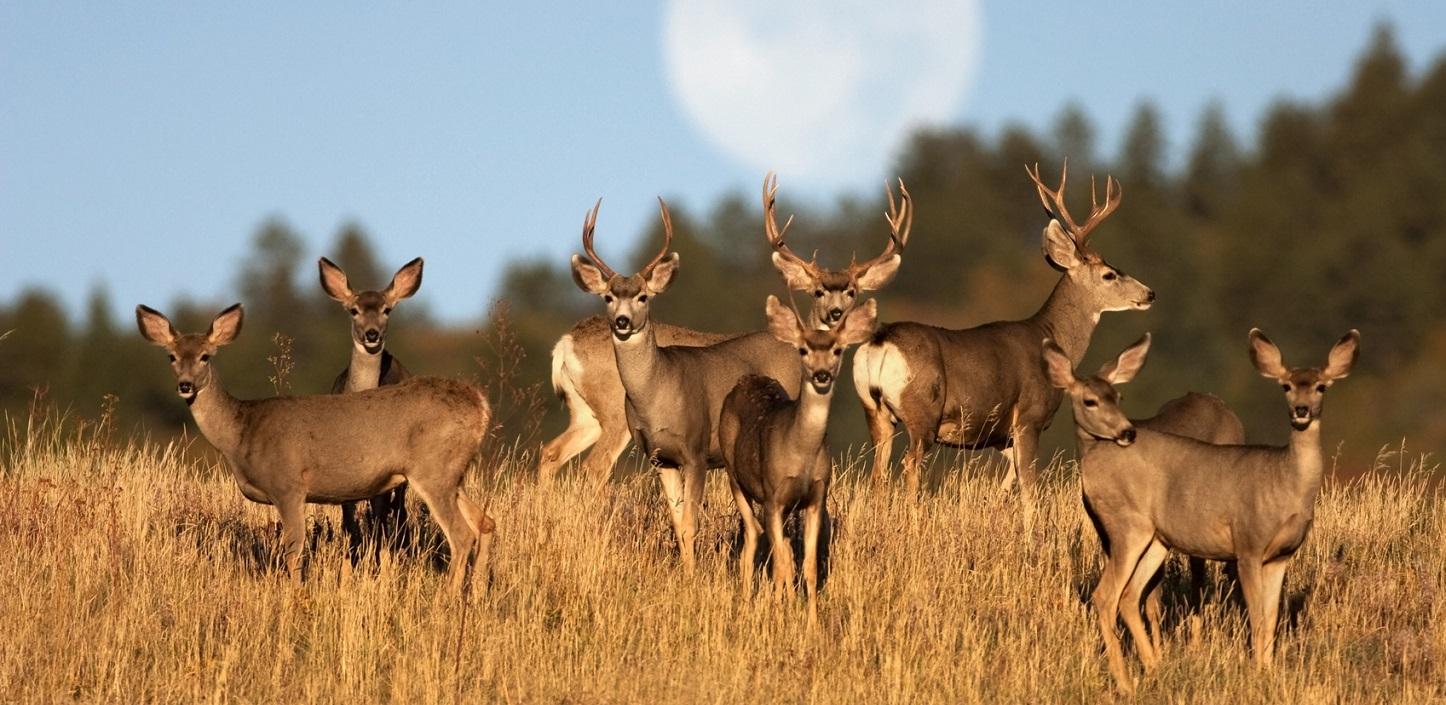
NFWF Announces $3 Million in Grants Via the Western Big Game Seasonal Habitat and Migration Corridors Fund
Ten organizations will work to protect migration corridors and improve habitat for pronghorn, mule deer and elk across the Rocky Mountain Rangelands
WASHINGTON, D.C. (March 26, 2024) – The National Fish and Wildlife Foundation (NFWF) today announced $3 million in funding for 10 grants that will conserve and restore key migration corridors and seasonal habitat for elk, mule deer and pronghorn in Arizona, California, Colorado, Idaho, Montana, Oregon and Wyoming. The grants will leverage $8.8 million in matching contributions for a total conservation impact of $11.8 million.
The grants were awarded through the Western Big Game Seasonal Habitat and Migration Corridors Fund, a partnership between NFWF, the Bureau of Land Management, the U.S. Fish and Wildlife Service, the U.S. Forest Service and ConocoPhillips. The Western Big Game Seasonal Habitat and Migration Corridors Fund aims to conserve critical winter range and migration corridors to maintain healthy populations of pronghorn, elk and mule deer, and the phenomenon of big game migration, by investing in habitat conservation projects within focal areas prioritized by states or Native Nations.
“Healthy habitats and interconnected spaces to live and roam are key for the sustainability of species,” said Secretary Deb Haaland. “The Biden-Harris administration is strengthening public-private partnerships and employing an all-of-government approach to ensure the conservation of fish and wildlife in the West and across America through the protection of key migration corridors and habitats.”
The western United States is home to some of the largest herds of wild native ungulates in North America. However, the seasonal migrations many of these populations rely on in response to weather conditions and resource availability face significant threats. Habitat fragmentation often limits the availability of high-quality forage and cover, and poor habitat condition limits the health and reproductive success of the herd. The projects supported by the 10 grants announced today will tackle these problems, among others, to restore and protect big game species and the rangeland habitats they need to survive and thrive.
“Migration corridors in the western United States provide crucial linkages between summer and winter ranges not only for our focal species, elk, mule deer and pronghorn, but for a whole host of other wildlife species,” said Jeff Trandahl, executive director and CEO of NFWF. “By working strategically with the Department of the Interior, Native Nations, and state wildlife and fish agencies, we are helping to restore both connectivity and habitat availability for these iconic species.”
This slate of 10 projects is expected to:
- Remove or improve 70 miles of fencing to wildlife-friendly standards
- Improve management on 440 acres of rangelands
- Restore 19,420 acres of public, private and tribal lands
- Place conservation easements on 1,930 acres
As an example of the work to be performed, in order to protect priority herds, the Wyoming Game and Fish Department and other agencies will improve derelict fencing, which is detrimental to mule deer movements in Wyoming, as well as restore critical winter range habitat by removing invasive weeds and encroaching conifers. These projects will result in improved forage resources and connectivity between seasonal ranges for mule deer and a wide variety of other wildlife.
To accomplish this landscape-scale and cross-jurisdictional project, Wyoming Game and Fish Department is partnering with the Wyoming Wildlife Natural Resource Trust, Bureau of Land Management, the U.S. Forest Service, the U.S. Fish and Wildlife Service, Rocky Mountain Power, Wyoming Department of Transportation and various private landowners and federal land permittees to address multiple threats that impact an important long distance mule deer migration.
Since 2019, there have been six rounds of grants awarded under the Western Big Game Seasonal Habitat and Migration Corridors Fund, which have cumulatively awarded $18.6 million across 76 projects, leveraging $81.1 million in matching contributions to generate a total conservation impact of nearly $100 million. Together, these projects will:
- Protect 176,900 acres of private land from fragmentation through conservation easements
- Restore 148,400 acres of public, private and tribal land through efforts like invasive weed and conifer removal treatments
- Improve management on 902,400 acres of public, private and tribal land through efforts like grazing and wildlife management plans
- Remove or improve 960 miles of fencing to be more wildlife friendly, reducing direct mortality and increasing landscape connectivity
- Restore hydrology on 41,500 acres of public mesic habitat
A complete list of the 2024 grants made through the Western Big Game Seasonal Habitat and Migration Corridors Fund is available here.
About the National Fish and Wildlife Foundation
Chartered by Congress in 1984, the National Fish and Wildlife Foundation (NFWF) protects and restores the nation’s fish, wildlife, plants and habitats. Working with federal, corporate, foundation and individual partners, NFWF has funded more than 6,800 organizations and generated a total conservation impact of $10 billion. NFWF is an equal opportunity provider. Learn more at nfwf.org.
###
Contact:
Rob Blumenthal, 202-857-0166, rob.blumenthal@nfwf.org